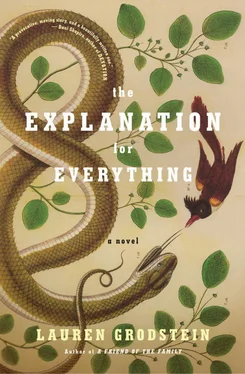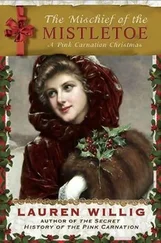“I’m not avoiding you,” he said. “Honestly. I’ve just been busy.”
She turned to him like she knew that he was lying. But instead of calling him on it, she said, “Fair enough.”
“Really,” he said. He stood too, went to where she was standing, tried patting her on the shoulder but the gesture felt forced so instead he gave her a half hug. She leaned her head against his arm for a second, but he couldn’t tell if she was stiffening inside.
“You okay?” he asked.
“Sure,” she said. Then she gathered her coat and called for Jeremy and said good-bye to Andy with a brief but not gingerly hug, and he felt like they’d be okay after a while, that they would still be friends. He wouldn’t talk about his research with her anymore and she wouldn’t talk about the guy who killed Louisa and that way they would still be friends.
But later, as he was tucking Belle into bed, she asked him if she and Jeremy were going to be brother and sister one day.
“I’m sorry? Are you what?”
“That’s what he said,” Belle said. “That his mother said that maybe he and I would be brother and sister one day. With Rachel.”
“I don’t think so,” Andy said. He kissed her on the head. “He must be daydreaming.”
“So you and his mom aren’t getting married?”
“Belle, I promise you I would tell you if I were getting married.”
“That’s what I thought,” she said. “Okay.”
It was almost ten when he went back out to the kitchen, where Rachel was assiduously chopping garlic. Ordinarily he would have told her it was probably a little late for cooking, and ordinarily she might have either listened or ignored him, but now, humiliated, he went straight for the television, unwilling to know what his oldest daughter knew, and unable to ask her any questions.
Princeton was one of the most beautiful places Andy had ever seen—rolling lawns and dignified courtyards and cottage-like shops selling Spode china—but still he left the day after he received his PhD and never returned. In fact, he’d been in Miami four years already before the thing happened between Rosenblum and the girl. It was this thing that ended his friendship with Rosenblum, not because Andy was so ashamed of what Hank had done (although he was) but because he had been too busy with his life in Miami to reach out to him, pick up the phone. As far as he knew, Rosenblum had never forgiven him his absence. But Andy also knew he’d been replaced in the old man’s heart several times in the four years between his departure from Princeton and the incident with the girl; Rosenblum was profligate with his affection, but not constant, and several graduate students had already taken Andy’s place even before the girl came along. Andy heard from some of them. Others, in shock, buried their heads in their own work, too sad about the girl, whom many of them had known.
The girl. Louisa had been stunned but not surprised by the grotesque story, and Rosenblum’s behavior. “I always had a feeling Hank was going to get ahead of himself one day, do something accidentally terrible.”
“I still feel bad for him.”
“Are you going to reach out? Here, hold her down.” She was squeezing a dropperful of antibiotics into Belle’s wailing maw, Belle who was plagued by ear infections until she got tubes on her second birthday.
“I will,” Andy said, “I’ll call him,” knowing even then he wouldn’t—knowing that it was possible he would never speak to Rosenblum again. After the antibiotics, they gave Belle Tylenol, then walked her in her stroller around Quail Run’s pool until she fell asleep.
But although Andy never did call, he kept up, to a certain extent, with Rosenblum’s whereabouts, first through the news reports and later through an informal network of postdocs who kept a lane of the Internet thrumming with news of the great man’s peregrinations. It seemed Rosenblum was in Europe for a while, then South America for a valedictory tour through Darwin’s Galápagos, cataloging those famous finches. Then the lawsuit went through and Rosenblum was suddenly bankrupt (Princeton refused to cover him, as he had already been dismissed when the verdict came in) and now, according to reports, Rosenblum lived near Montauk, in a small house given to him by an admirer of Religion’s Dangerous Lie.
Andy had thought about calling him when Lou was killed, then thought again. It was selfish to look for pity where he had offered none; moreover, Rosenblum’s thoughts on death were broadly admirable but, on a person-to-person level, repellant.
Regardless, Andy was haunted by his old mentor—or, if not haunted exactly (only one person was allowed to haunt Andy at a time, thank you) certainly he felt attached to his memory, and often trailed by a feeling that Rosenblum was just around the corner, smoking a pipe, pontificating. Which is why he felt both astonishment and satisfaction to find a large envelope sitting on his office desk one morning covered in Rosenblum’s kindergarten penmanship. He’d been expecting this without realizing he was expecting it.
“Rosemary? Where’d this letter come from?”
“UPS just dropped it off. Why? Is it suspicious?”
“No,” Andy said. “It’s just…” He sat down on his chair to examine the envelope—it had a return address from a legal office, but the handwriting was unmistakable. Rosenblum! That old bastard. He held the letter in both hands, admiring it. A part of him wanted to kiss it. God, he’d missed him. He would not tear open the letter; he would savor it like a gift.
“Professor?” A timid knock on his open door. Lionel Shell, in a sweater-vest.
“Lionel?”
“I wanted to tell you thanks for the other day. I’m doing much better now. You really—I appreciated our talk. Thank you.”
“Great,” Andy said. “Glad to hear it.” He gave Lionel his you’re-dismissed look, turned back to the letter. He’d forgotten how even Rosenblum’s toddler scrawl could inspire, in him, a sense of revelation: when he first started working with Rosenblum he wondered if he should save the memos the great man left him just in case they were worth something some day. He’d imagined himself, in his wilder flights of fancy, one day cataloging Rosenblum’s papers in the scientific libraries of Princeton or Oxford or MIT, archiving both the brilliant manuscripts and the tedious minutiae, and contributing, from his own files, forgotten handwritten missives like “see notes on self-reinforcing divergence” or “I’ve got some pastrami in the fridge.” And now, again, Rosenblum’s writing in his hands.
“You got a present?”
Lionel was still in his doorway.
“I thought you left.”
“You going to open it?” Lionel said, smiling. He came into the office, plopped himself on Andy’s extra chair.
He was too pleased even to scowl at Lionel. “Oh, why not?” Andy enjoyed the anticipatory beat of his heart for one more second, then took a pair of scissors from his drawer and slid them along the side of the envelope, opening it to reveal a handwritten note on stationery with a legal letterhead.
“Who’s it from?”
“Jesus, Lionel, could I have a little privacy?”
Lionel looked wounded. “Sure. Sorry.” The boy collected himself, went away.
The letter was vintage Rosenblum:
Waite, been keeping up with yr dealings, know you filed for tenure. Assume you can’t be hurt now from dealing with a semicriminal like yr old pal Hank. Proud of you for getting this far by the way, although half-ass school you gotta admit. Do you admit it? What kind of man have you become, anyway?
Wrote a book and would like your opinion if you still have time for the man who made you who you are. If not, you can fuck yrself. But if you’re willing to look the thing over, send me a note care of my lawyer at Briggs Watson, New York. Thinking of you fondly. Hank Rosenblum
Читать дальше












